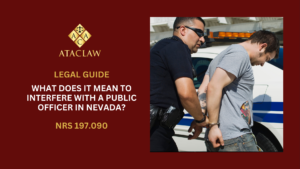Misunderstanding or misconstruing laws can lead to severe consequences, and that’s precisely why we’re here to help clarify and explain the legal jargon in layman’s terms. In today’s post, we focus on one notably intricate aspect of Nevada law: NRS 197.090, known as “Interfering with a Public Officer.” We demystify what constitutes this interference, how it diverges from obstruction, and discuss the potential legal implications. So, let’s delve right in to separate fact from fiction and help you better understand this crucial piece of legislation.

What Constitutes “Interfering” With a Public Officer?
In Nevada, the term “public officer” is detailed under NRS 169.164. This statute describes a public officer as an individual who has been either elected or appointed to a role. This role, according to the legislation, must be set up by the state’s constitution or a statute, or by a charter or ordinance from a political subdivision within the state. Additionally, the role must involve the regular and continuous exercise of public authority, trust, or duty as part of the government’s permanent administration. So, when you think of public officers in Nevada, people like elected officials or sheriffs would fit this description.
Nevada law, under NRS 197.090, delineates “interfering with a public officer” as a critical offense, but how does it diverge from NRS 197.190’s obstruction of a public officer? Unlike mere non-cooperation classified under obstructing, interfering involves active attempts to prevent a public official from performing their legal duties. This is executed through force, violence, or threat, marking it as a more severe variant of resisting arrest, yet applicable to a broader spectrum of elected and appointed officials.
What are the penalties for interfering with a public officer in Nevada?
If you interfere with a public officer in Nevada, it’s treated as a gross misdemeanor, which can lead to:
1. A maximum of 364 days in the county jail, and/or
2. A fine that might reach up to $2,000.
However, things can get quite serious if the officer gets injured during the interference or if a deadly weapon is employed. In this case, the charge could be escalated to battery. A battery that results in an injury to a public officer qualifies as a category C felony. The associated penalties can include 1 to 5 years in a Nevada state prison and there’s a possibility of a fine up to $10,000.
If the injury to the officer is substantial or involves a deadly weapon or strangulation, it moves up to a category B felony. This more severe charge packs potential penalties of 2 to 10 years in Nevada state prison, along with a possible fine of up to $10,000.
Can You Defend Against Charges of Interfering with an Officer in Nevada?
Defending against charges of interfering with an officer in Nevada hinges on the specifics of your situation. To be deemed guilty of such interference, you must either have knowingly impeded the officer’s lawful duty or resisted them intentionally. Common defenses in these cases include:
Accidental behavior: If your actions were unintentional and you didn’t knowingly obstruct the officer, you can’t be convicted.
Officer not performing a legal duty: If the officer was off-duty, acting beyond their official capacity, or engaging in unlawful conduct, your interference may not be considered criminal.
Misconstrued speech or actions: If any perceived threats were vague and lacked credibility, they may not meet the threshold for criminal interference.
Insufficient evidence: If there’s a lack of substantial evidence, especially in cases where it’s your word against the officer’s, charges could be dismissed or reduced.
Legal justification: If you were acting in self-defense against excessive force or if your actions were solely verbal, your resistance might be legally justified.
Police misconduct: If law enforcement violated your rights, such as through false testimony or failure to uphold proper procedures, our defense attorneys will investigate and present evidence to support your case.
If you or someone you’re acquainted with is facing charges of resisting arrest or obstructing a public officer in Nevada, we encourage you to reach out to us for a consultation. Our team of criminal defense lawyers in Nevada comprehends the intricacies of the state’s laws safeguarding public officials. We possess the expertise to identify weaknesses in the prosecution’s argument and utilize them effectively to vigorously contest the charges.
For further legal assistance and to discuss your case with an expert, don’t hesitate to contact ATAC LAW.
